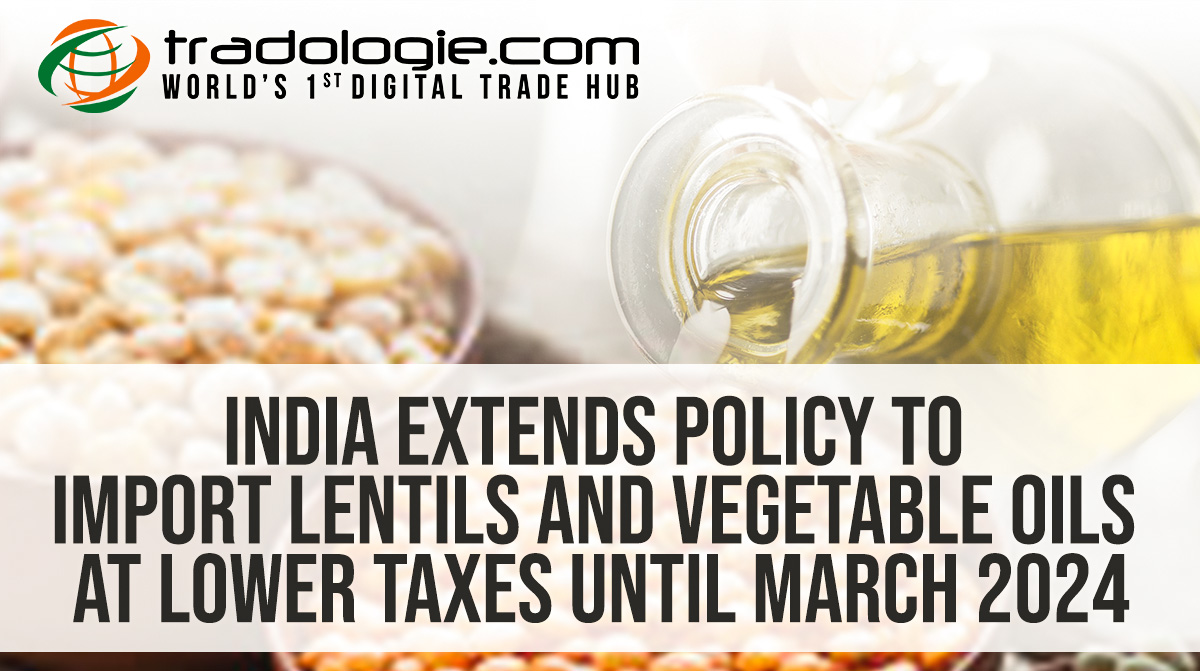Located in Asia, India is the 2nd largest consumer of vegetable oil in the world and tops the list when it comes to importing the commodity. The country meets around 55%-56% of its vegetable oil needs through imports. And, although the country’s oilseed production has increased over the years, consumption has also increased at a higher rate which has resulted in dependence on imports.
On 29th of December’22, the Government of India mentioned in a notification that it has decided to extend its policy on the imports of lentils and vegetable oils such as soy oil, palm oil, and sunflower oil at a lower tax for a year up to March’2024. The Government revises the base import prices of edible oils every fortnight and the prices are used to calculate the amount of tax an importer needs to pay.
The Indian Government mentioned that the country also allowed the imports of 150,000 tonnes of lentils and 34,000 tonnes of almonds and this was at 50% of the duty applied under the tariff-rate quota.
India’s Vegetable Oil Imports
India imports about two-thirds of its edible oil needs and in the recent few months, the country has struggled to contain the rising local prices of edible oils. The South Asian Country sharply reduced import taxes on Vegetable Oils in mid-2021 as the prices in the world markets of the commodity jumped to a record high with the lower import duty set to expire on 31st March’23. The import tax on crude palm oil has dropped down from 35.75% at the start of 2021 to the current 5.5% levied on the import of the commodity.
India imports its palm oil mainly from Indonesia and Malaysia and most of the oil arrives in a crude form that has to be refined domestically with only around 30% already refined. The other vegetable oils such as soy and sunflower mainly come from Argentina, Brazil, Ukraine, and Russia.
Domestic Palm Oil Cultivation
The import duty difference between crude and refined palm oil has resulted in higher imports of refined palm oil causing lower utilization of the domestic refining industry. In 2021, the Indian government launched the National Mission on Edible Oils to promote domestic palm oil cultivation, focusing on the northeast region and the Andaman and Nicobar islands, with a goal to reduce dependence on edible oil imports significantly.
India’s reliance on edible oil imports could compromise the national interest in the long run and it is imperative for the country to become self-reliant and sufficient to the best extent possible via the ‘Atmanirbhar Bharat’ initiative. This would lead to increased domestic oil seed production with an aim to reduce import dependence.
If you are an importer thinking to buy bulk quantities of vegetable oils or are an exporter thinking to export vegetable oils, then Tradologie.com is the right platform for you. Tradologie has over 600,000 buyers and 70,000+ exporters of food and agro-commodities from over 100 countries in its network and through the platform, you can conduct bulk agro-trade with ease.
To register as a buyer, click here. To register as a seller, click here.
To stay updated with the latest happenings of the agro-trade industry, do follow Tradologie.com across all social media channels.
REFERENCE
https://reut.rs/3WHwnVc


